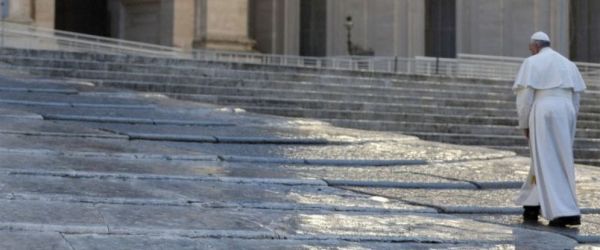Today’s Gospel, which takes place on the day of the Passover, describes the episode of the two disciples of Emmaus (Lk 24:13-35). It is a story that begins and ends on the move. There is in fact, the outbound journey of the disciples who, saddened by the epilogue of Jesus’ story, leave Jerusalem and return home to Emmaus, walking some 11 kilometres. It is a journey that takes place during the day, much of it downhill. And there is the return journey: another 11 kilometres, but at nightfall, partly an uphill journey after the fatigue of the outward journey and the entire day. Two trips: one easy in daytime, and the other tiring at night. Yet the first takes place in sadness, the second in joy. In the first one, there is the Lord walking beside them, but they do not recognise him; in the second one they do not see him anymore, but they feel him near them. In the first they are discouraged and hopeless; in the second they run to bring the good news of the encounter with the Risen Jesus to the others.
The two different paths of those first disciples tell us, Jesus’ disciples today, that in life we have two opposite directions before us: there is the path of those who, like those two on the outbound journey, allow themselves to be paralysed by life’s disappointments and proceed sadly; and there is the path of those who do not put themselves and their problems first, but rather Jesus who visits us, and the brothers who await his visit, that is, our brothers who are waiting for us to take care of them. Here is the turning point: to stop orbiting around one’s self; the disappointments of the past, the unrealised ideals, the many bad things that have happened in our life. Very often we tend to keep going around and around.... To leave that behind and to go forward looking at the greatest and truest reality of life: Jesus lives, Jesus loves me. This is the greatest reality. And I can do something for others. It is a beautiful reality: positive, bright, beautiful! This is the turning point: to go from thoughts about I to the reality of my God; going — with another play on words — from “if” [se in Italian] to “yes” [sì in Italian]. From “if” to “yes”. What does this mean? “If he had freed us, if God had listened to me, if life had gone as I wanted, if I had this and that…”, in a tone of complaint. This “if” is not helpful, it is not fruitful. It helps neither us nor others. Here are our “ifs”, similar to those of the two disciples, whom however, move to a yes: “Yes, the Lord is alive, he walks with us. Yes, we continue our journey to announce it now, not tomorrow”. “Yes, I can do this for the people so that they may be happier, so that people may better themselves, to help many people. Yes, yes I can”. From “if” to “yes”, from complaints to joy and peace, because when we complain, we are not joyful; we are in the grey, greyness, that grey air of sadness. And this does not help nor allow us to grow well. From “if” to “yes”; from complaints to the joy of service.
How did this change of pace, from “I” to “God”, from “if” to “yes”, occur within the disciples? By meeting Jesus: the two disciples of Emmaus first open their hearts to him, then they listen to him explain the Scriptures and then they invite him home. These are three steps that we too can take in our homes: first, opening our hearts to Jesus, entrusting him with the burdens, the hardships, the disappointments of life, entrusting the “ifs” to him, and then, the second step, listening to Jesus, taking the Gospel in hand, reading this passage in chapter 24 of Luke’s Gospel on this very day; third, praying to Jesus, in the same words as those disciples: “Lord, ‘stay with us’ (v. 29). Lord, stay with me. Lord, stay with all of us, because we need you to find the way”. And without you, there is night.
Dear brothers and sisters, we are always journeying in life. And we become what we go towards. Let us choose the way of God, not of self; the way of “yes”, not the way of “if”. We will discover that there are no unexpected events, no uphill path, no night that cannot be faced with Jesus. May Our Lady, Mother of the journey, who by receiving the Word made her entire life a “yes” to God, show us the way.
[Pope Francis, Regina Coeli 26 April 2020]












